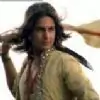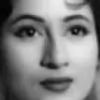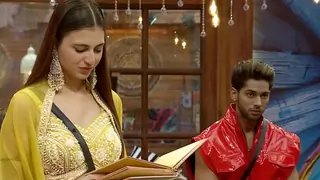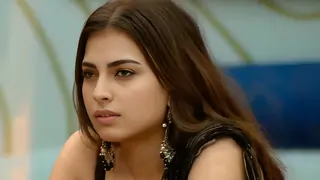Folks,
Consistency, the wise say, is the virtue of fools. Not being a fool, I am, after watching yesternight's wonderful episode, prepared to take back my lament on Episode 52, that it would have been been better for the development of the Jalal-Jodha story if the naatak had gone ahead after all.
The New Hope of my title of today is of course that of the first Star Wars film, but it also perfectly sums up what I felt at 8:30 pm last night. The beautiful, imaginative script, and the pitch perfect performances by the duo, have opened the door on a new vista. A vista of a new beginning, a beginning of a sincere, candid understanding of each other. An understanding based not on attraction on one side or the end of repulsion on the other, but on mutual, warm appreciation of each other's qualities of head and heart.
Jodha: Yesterday belonged to Jodha, and Paridhi sailed thru the whole effortlessly, projecting the simple, transparent, unclouded goodness of Jodha's whole persona with total conviction.
The unruffled dignity and nobility with which she answered Ruqaiya's wild accusations (which only revealed the depth of the latter's by now endemic insecurity vis a a vis this polar opposite of a woman, whom she cannot understand and thus hates). The warm gratitude with which she responds to the outpouring of love and admiration from her Ammijaan, touching her feet repeatedly in respect and affection. The genuine detachment and goodness of heart with which she silences the complaints of Motibai. And finally, the eager warmth and sincerity in her eyes, and her whole face, as she explains to the Shahenshah the import of her gift and her poem of welcome for the new arrival. Not one line, not one expression, however fleeting, was out of place, not one was either over the top in cloying mahaanta or found wanting in sincerity.
It was a visually and tonally perfect performance which gladdened by my heart, for though I am no sentimentalist, and have by now, with age and experience, become more of a cynic than anything else, genuine goodness always moves me.
But the most arresting bit in the whole was not in any of the above-mentioned scenes. It came when Jodha is leaving Hamida Banu's rooms, after the latter voices the hope that Jodha too would soon give her the same happiness that Ruqaiya was now about to do. Jodha's smiling face becomes serious, and she tries to smile, the right side of her mouth lifting in a forced attempt at cheerfulness.
As she comes out of the room, the flames from a nearby mashaal shade her face, which appears and disappears as they waver in the breeze. Her eyes seem desolate, clouded with a sense of despair. What is it that she feels? She believes what she says earlier to Ruqaiya, that a woman, no matter how highly placed, is truly fulfilled only in motherhood. Is the sudden sorrow reflected in her eyes because she sees this longed for motherhood, as she sees it, forever outside her grasp? I felt so.
Jalal: He too was a revelation last night. I have often written that what Jalal feels for Jodha is neither a pedestrian attraction rooted in admiration of her beauty, nor physical desire, nor even the pull of the unusual in the first woman who, far from running after him like all the others, does not even want him. It was always something more, a desire of the heart that he could not understand when it dragged him on that dangerous adventure to Amer just to catch a glimpse of her.
It was the same with Jodha. The face in the water that haunts her conscious and her subconscious, the face she sees even with her eyes closed. Now that she knows whose face it was, she has buried it deep inside her, under layers of stubborn and irrational ghruna. A ghruna that she repeats to herself every now and then as if she might otherwise forget it! But it is there, nonetheless, and as she watches Jalal leave her rooms, it is reflected once more in the curiously gentle expression in her eyes. A look of tentative hope, which seeks more of it knows not what.
The scene in Ruqaiya's rooms as Jalal opens Jodha's gift brings out with blinding clarity the basic difference between the two of them.
Jalal instantly sums up what lies behind Jodha's lovely poem to the child he awaits: Lagta hai ki dil se likha hai. But it needs a dil, and a sensitive and perceptive one, to recognize what another such dil feels.
Ruqaiya, on the other hand, is unseeing in her total self-centredness and foolish vanity: her comments about Jodha's supposed chaaploosi, and her apparently trying to cultivate Ruqaiya's favour are incredible in their blind folly. I do not suppose that Jalal, still lost in the aural beauty of the poem, even hears what she says, which is probably just as well for her!
I am convinced that when the break comes between Ruqaiya and Jalal, after the loss of her child, it will not be because she was careless and this led to the (anticipated) miscarriage. Even if he is furious with her for that, he will never cut her off, for he will assume that her grief at the loss would be even greater than his, being coloured by her sense of guilt.
But if and when he hears her, as is most likely, lamenting not the loss of the child, but of the power that a son of hers would have gained her, the scales will fall from his eyes in one fell sweep. It is the shock of this discovery that will make him cut her off for good. He can forgive his childhood friend anything, even her indifference to his suffering at the death of his Khan Baba. But not the lack of caring for the child he wanted so desperately and loved so much already. It is then, methinks, that the bell will toll finally for Begum Ruqaiya Sultan.
To revert, when the lines of Jodha's poem haunt Jalal's sleep and echo and re-echo in his zehen, the underlying note, for all that he remembers her beauty seen up close, is one of gratitude, of a sudden emotional connect. He understands instinctively that her joy at the prospect of the child is both deep and genuine, and it is this generous and caring spirit that touches him as perhaps nothing else so far in his life.
(NB: It is this conviction of Jalal's that will negate any attempt that Mahaam Anga, with her talent for killing several birds with a single stone, might eventually make to blame Jodha for the loss of Ruqaiya's child).
It is this same gratitude that lights up his whole face when, after having listened, with unwinking concentration, to Jodha's enthusiastic explanation of the significance of the spoon and the meaning of her poem, he praises her words for having embellished and enriched her gift.
For the first time, he smiles at her with a warmth that is untinged with even a hint of the usual mockery or one-upmanship, or even his trademark mischievous flirtatiousness. It is a smile of empathy, of understanding, of a liking that is direct, candid and genuine. Something that he has perhaps never before felt for a woman. The same empathy, of recognition of what he feels, and of a reluctant liking, are reflected in Jodha's eyes as she watches him leave.
It is in this quantum shift on both sides that the new hope of my title is rooted.
Titbits: The little exchange between Jalal and Jodha, about her oblique manner of getting him to leave, was delightful in itself, but even more so for the sense of camaraderie in her retort and his comeback. At long last, they are on the way to becoming friends, and there is no stronger foundation for eventual love than friendship.
Jalal's phenomenal memory for the spoken word. He is able to recite the whole poem, most of the words in which he cannot understand, faultlessly after just one hearing, which shows how keen is his faculty for Shruti . No wonder Akbar always had something significant read out to him daily before he retired for the night. It must all have imprinted itself in his memory, word perfect and docketed away for future reference.
The sudden sense of deprivation on Jalal's face when Ruqaiya, with unthinking casualness, asks him to read Jodha's poem. That he cannot read and write is a lifelong and bitter regret for Jalal; remember his rooh describing himself, even centuries later while speaking to Jodha's rooh, as an anpadh jaahil? That Ruqaiya rubs this wound raw, and does not even realise it, is typical of her.
Jalal's curious expression when Mahaam Anga asks him whether he agrees with his Ammijaan's paean to Jodha. It is not resentment or even mild jealousy, but rather a bemused, and amused, acceptance.
One feels for Mahaam Anga in the precap, yelling at an obviously sozzled Adham in furious frustration. If they had had hospitals for deliveries in those days, she would surely have sued them for saddling her with a changeling😉!
Jodha watching Jalal dancing, with Rahim on his shoulder. We cannot see thru the veil, but I am sure she is a tad more reassured about the capacity for affection in the erstwhile Jalal the Jallad, the ogre whose image is fast fading in her mind.
Shyamala B.Cowsik




































366